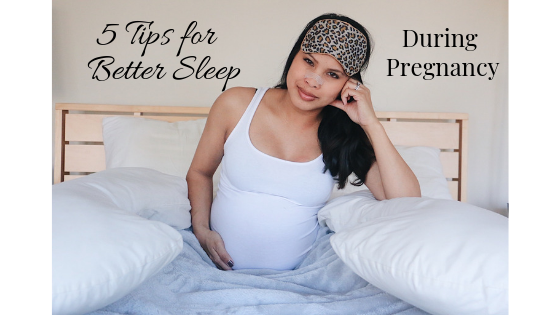We’ve all heard people say this when you’re pregnant, “Sleep while you can!” followed by a myriad of personal anecdotes about parental exhaustion, never sleeping again etc. While sleep during pregnancy is very essential for growing a tiny human and for your own health, it’s often easier said than done. Many women suffer from sleep disturbances in pregnancy, much due to physiological reasons and surging hormones. Aside from the fluffy info (e.g. don’t look at your phone 30 mins prior bedtime, meditate, go to bed early), I’m breaking down some clinical solutions with 5 tips for better sleep during pregnancy.
1. Get yourself into position- using pillows or maternity pillow
-
Left side-lying
After the first trimester, it can become uncomfortable for a pregnant woman to lie and sleep on her back and therefore side-sleeping is best. It’s also safer for you and baby to lie on your side, specifically your left. This is to alleviate compression from the growing uterus/fetus on the Inferior Vena Cava, a large blood vessel that runs on the right side of your spine that provides blood back to your heart. I’m more of a right-side sleeper, so I empathize with you if left is not always comfortable. Bottom line, either side is better than your back. You might notice if you lay on your back that you become dizzy or lightheaded, this is a symptom of that blood vessel being compressed, so roll over, Mama!

-
Keep yourself in alignment
You’re more susceptible to joint-related pain during pregnancy, especially low back pain. By putting pillow between your knees down to your ankles, under your belly and behind your back while in side-lying, you will be supporting your entire spine and bump.
-
Prop yourself up
We’ll discuss breathing and acid reflux in detail below, but elevating from the shoulders and up can help with sleep. Be sure that your supporting below the shoulder, not just at the head, as this can put you in a laterally flexed position and a literal pain in the neck when you wake up.I LOVE my maternity pillow that my hubby bought me during my first pregnancy. It’s U-shaped so you can lie on either side and provides support in all the right areas. Here are a few on the market that have some great reviews:
2. Help yourself breathe better
During pregnancy, you may develop rhinitis, AKA nasal congestion. This is due to increased circulation and swelling in your mucous membranes, including those in your nose. If you are not breathing effectively while you sleep, you’re not receiving enough oxygen and therefore will wake up feeling extra-exhausted. I’ve had prenatal rhinitis every pregnancy and it is not fun, especially when it comes to sleep. Avoid nasal decongestants, such as pseudoephedrine (most allergy meds with “-D” at the end), as they are not safe to take during pregnancy. Talk you your physician about med options, but here are some natural treatments:
-
Nasal Strips-
These are GREAT. Stick one of those extra-strength sticky strips on the bridge of your nose and feel the glorious openings. Word to the wise with toddlers- they may try to rip them off your face early in the morning.
-
Saline spray/nettie pot
A non-steroidal saline spray or use of a nettie pot can help flush out a lot of that built-up mucous so that you can breathe better.
3. Avoid heartburn triggers
As your belly grows, organs are shifting in your abdominal cavity, causing pressure on the stomach. This in turn causes stomach acid to rise back up from where they came and result in a burning sensation in your chest area or throat. This is known as Acid Reflux or “heartburn”. A more severe and longer-lasting form of acid reflux is Gastroesophageal Reflux Disease (GERD), but during pregnancy acid reflux is typically transient and should alleviate after delivery.
-
Caffeine, Spicy food, Citrus, Acidic foods
These can all cause acid reflux. You definitely want to avoid these types of food at least 30 mins before bedtime, or if the reflux is there around the clock, potentially eliminating them from your diet while pregnant.
TIP: Avoiding food, not just the heartburn triggers, before bed can help baby rest easy too. If you notice that after eating, especially consuming something sugary, baby starts doing what feels like the Macarena in your belly, that’s because he/she is metabolizing whatever you just ate. This may keep you up past your bedtime.
-
Elevate your head
Positioning you head above your heart and stomach while sleeping can also help with decreasing the acid flowing back up your esophagus. After you eat, remain upright for at least 30 minutes.
-
Take an antacid
Oral antacids, like TUMS, has been approved as a safe medication to take while pregnant. You should avoid antacids that contain sodium bicarbonate, or baking soda, as there are some effects it can have on swelling. Consult with your physician first.
*FUN FACT!!*: the old wive’s tale about heartburn indicating baby’s hair growth in utero actually has been supported by scientific evidence. This study published in 2006 found that, “pregnancy hormones in both the relaxation of the lower esophageal sphincter and the modulation of fetal hair growth.” This explains my three pregnancies of reflux and 2, potentially 3, full-haired babies!
4. Prevent nerve pain and muscle cramps
Ever wake up in the middle of the night in agonizing pain from a Charlie Horse or other muscle cramp in your limbs? Tingling, pins and needles in your hands or feet? This is sleep disturbance on 100. Although the causes are still somewhat unknown, there are some theories about nerve compression from the growing uterus, insufficiency of certain minerals, dehydration etc. There are some solutions that have proven to be relatively helpful:
-
Hydrate
Muscle cramping, typically in the lower extremities, can occur due to dehydration. Fluid intake is like fuel and oil to your muscles and their cells, helping them contract/relax with ease.
-
Increase your potassium, calcium, magnesium intake
Depletion of these minerals can possibly lead to muscle cramping. Maintain a balanced and varied diet that includes bananas, cantaloupe, whole grains, beans, dried fruits, nuts and seeds, milk and yogurt.
-
Stretch before bed
You can stretch in sitting, using a belt or yoga band hooked around the balls of your feet to pull them toward your face and stretch out your calves. Alternatively, you can stretch in standing. Standing 2 ft from the wall, step forward with one foot and lean your weight into your hands on the wall. Feel the deep stretch to your calf with knee straight, and then gently bend your knee with heel still intact with the ground. Switch sides.

-
Manage Carpal Tunnel Syndrome
You may have seen my post about Carpal Tunnel Syndrome in pregnancy, which is a common occurrence. Check this post for stretches to do before bed, positioning and recommendations for wearing wrist splints at night. Be mindful of positioning yourself in a ball or fetal position in bed, as the bend in your wrist can increase tingling and numbness in your hands.
**RED FLAG**- If you are having prolonged leg pain, cramping or excessive swelling, especially in one leg, let your physician know ASAP. They may need to screen out more serious conditions such as a blog clot or preeclampsia.
5. Hydrate during the day, not at night
I know in the previous point I just said to hydrate to reduce the risk of leg cramps. HOWEVER, drinking a lot of fluids right before bed can obviously have it’s drawbacks on your bladder. You already have a growing uterus pressing on your bladder, causing frequent potty-breaks. It probably goes without saying, but try to empty your bladder before you hit the pillow. If you get parched during the night, take small sips of water, instead of massive gulps.
So that’s it. Unfortunately, sometimes difficulties with sleep during pregnancy are inevitable. Hopefully some of these techniques can alleviate some of the disturbance you may experience while trying to catch those much needed zzz’s.



